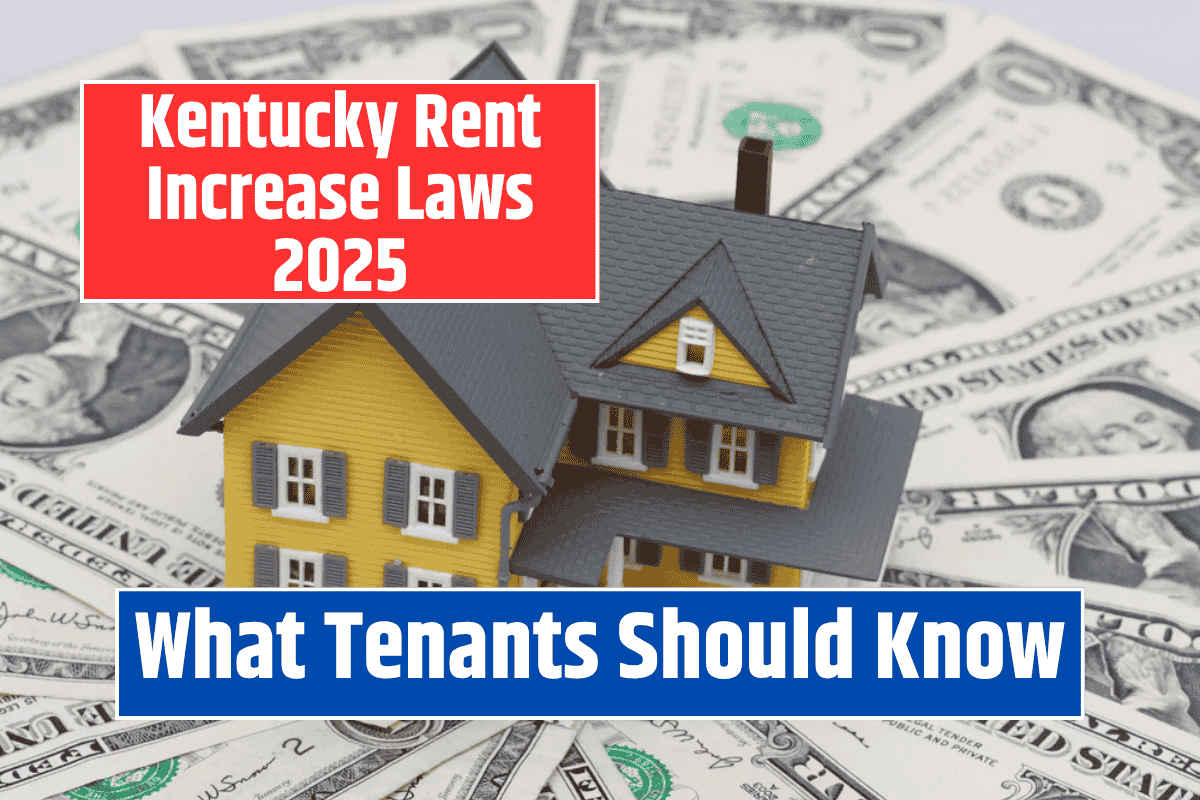Renting a home comes with responsibilities, and so does being a landlord. In Kentucky, there are no state-wide rent control laws, which means landlords can raise the rent without a limit when a lease ends. However, there are rules in place to ensure tenants get fair notice before any rent increase.
In this article, we’ll break down the 2025 Kentucky rent laws in simple terms to help tenants understand their rights and what steps they can take if faced with a big rent hike.
Understanding Rent Increases in Kentucky
Kentucky does not have rent control, so landlords are free to set or increase rent based on market demand. That said, rent can’t be raised in the middle of a lease unless the lease allows it. Most commonly, rent is increased at the end of a lease term.
If you’re on a month-to-month lease, landlords must give you written notice 30 to 60 days in advance before increasing rent. For fixed-term leases, notice must also be given before the lease ends—usually 30 to 60 days prior—if the landlord plans to raise the rent upon renewal.
Key Kentucky Landlord Responsibilities
Even though landlords can increase rent, they must still follow certain rules under Kentucky landlord-tenant laws, including:
Providing Safe and Habitable Living Conditions
Landlords must maintain the property so that it’s safe, clean, and livable. That means making sure things like heat, plumbing, and electricity work properly.
Making Timely Repairs
Any repairs that affect health and safety—like mold, pests, or broken appliances—must be fixed quickly after tenants report them.
Respecting Privacy
Landlords must give at least 24 hours’ notice before entering your home unless it’s an emergency. They must also enter at reasonable times.
Returning Security Deposits
After a tenant moves out, landlords must return the security deposit (minus any damage deductions) within 30 days and provide an itemized list of any deductions.
Following Anti-Discrimination Laws
Landlords cannot discriminate based on race, religion, gender, disability, family status, or national origin when choosing or treating tenants.
Tenant Rights Under Kentucky Law
Tenants in Kentucky have clear rights, including:
The Right to a Habitable Home
If a rental unit isn’t safe or livable, tenants can withhold rent or take legal action if the landlord doesn’t fix the problem.
The Right to Privacy
Landlords can’t enter your home without proper notice. Emergency situations are the only exception.
Protection from Discrimination
Tenants are protected from unfair treatment under federal and state anti-discrimination laws.
Proper Notice Before Rent Increases
Rent can’t be raised without advance written notice. For month-to-month leases, this usually means at least 30 days.
No Limits on How Much Rent Can Be Increased
Unlike some other states, Kentucky law doesn’t limit how much rent can go up each year. Landlords can raise rent by 5%, 10%, or even more—as long as they give proper notice and follow lease rules. Market demand often decides how high landlords can reasonably set rent.
However, they cannot raise rent in the middle of a fixed lease unless your lease says so. If your lease is ending, expect any new rent amount to apply at renewal time.
What Can Tenants Do If Rent Goes Up Too Much?
If you feel your rent has gone up too high, here are a few options:
Talk to Your Landlord
Often, landlords are willing to negotiate—especially with tenants who pay on time and take care of the property. Bring market rate comparisons or explain your financial situation to seek a smaller increase.
Decline the Increase
If you don’t agree with the new rent, you’re not forced to accept it. The landlord might try to evict you, but they must follow proper legal steps. You can fight the case in court if the increase seems unfair.
File a Complaint
You can report unfair rent hikes to the Kentucky Attorney General’s office. This won’t stop the increase but can help if legal action is needed.
Organize with Other Tenants
If you live in an apartment complex and many tenants face similar increases, consider speaking up together. A group complaint carries more weight.
Advocate for Local Rent Rules
Even though state law blocks rent control, local organizing may push for tenant protections through other legal changes.
What Is Kentucky Statute 383.595?
This law bans cities and counties in Kentucky from creating their own rent control rules. It means that rent amounts must be set by the free market, not by government limits. Landlords have the right to charge whatever they want for their properties, as long as they don’t break other housing laws.
Other Landlord Responsibilities
Landlords must also:
Keep the property in good condition
Fix broken systems like water or electricity
Maintain shared spaces in multi-unit buildings
Follow all health and safety codes
Snow and ice removal may be required depending on the lease
If these duties are not met, tenants have legal options—such as withholding rent or moving out without penalty.
Kentucky Eviction Laws
Evictions must follow legal procedures:
For nonpayment of rent, a landlord must give a 7-day notice to pay or leave.
For lease violations, they must provide 30 days to fix the issue.
For no cause evictions, they must give 30 days’ notice if they don’t plan to renew the lease.
Landlords can’t just lock you out or force you to leave. They must go to court if you don’t move out after proper notice.
While Kentucky doesn’t cap rent increases, tenants do have important protections under state law. Knowing your lease terms, staying aware of your rights, and keeping open communication with your landlord can help you manage any rent changes smoothly.
Always request any changes or notices in writing and never hesitate to ask for legal advice if you feel your rights are being violated. Understanding how rent laws work in Kentucky can help you make better housing choices and protect your finances in 2025 and beyond.












